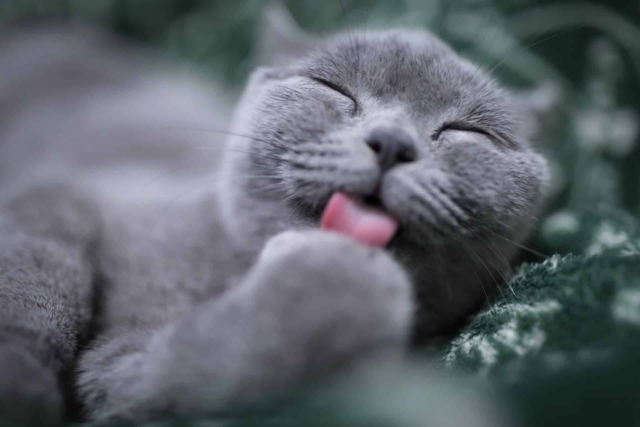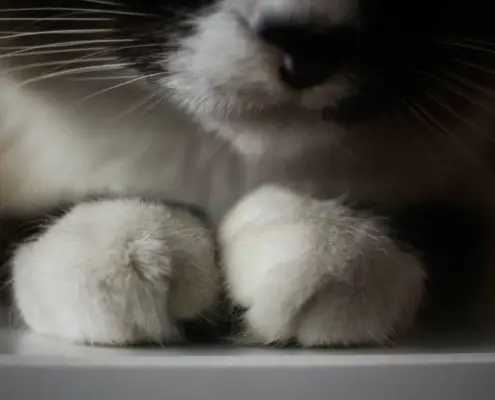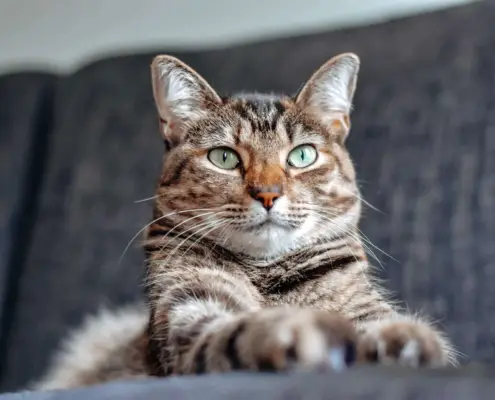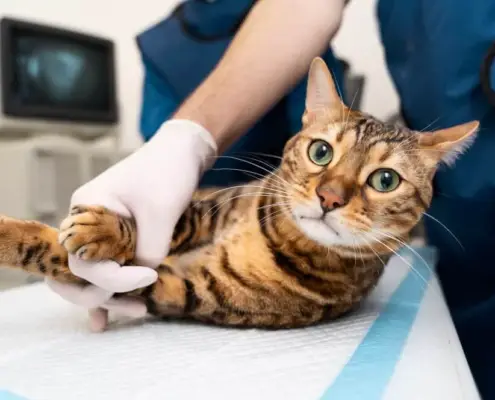
Miscarriages, also known as spontaneous abortions, are a heartbreaking occurrence that can affect not only humans but also our beloved feline companions. While it is not as widely discussed, cats can indeed experience miscarriages. Understanding the causes, signs, and prevention of miscarriages in cats is crucial for responsible pet owners.
Miscarriages in cats can occur due to various reasons. One common cause is genetic abnormalities in the developing fetuses. Sometimes, the mother’s body recognizes the abnormalities and naturally terminates the pregnancy. Infections, such as feline panleukopenia virus or feline herpesvirus, can also lead to miscarriages. Certain hormonal imbalances, such as low progesterone levels, can affect the cat’s ability to maintain a pregnancy.
Causes of miscarriages in cats
Genetic abnormalities, infections, and hormonal imbalances are not the only factors that can cause miscarriages in cats. Trauma or injury to the mother’s abdomen can result in the loss of pregnancy. Excessive stress or anxiety can also play a role in triggering miscarriages. Additionally, nutritional deficiencies or exposure to certain toxins or medications can increase the risk of miscarriage in cats.
It’s essential for cat owners to be aware of these potential causes and take preventive measures to minimize the chances of a miscarriage. Providing a balanced and nutritious diet, keeping the cat’s environment stress-free, and avoiding exposure to harmful substances are some of the proactive steps that can be taken to safeguard the health of the mother and her unborn kittens.
Signs and symptoms of miscarriages in cats
Identifying a miscarriage in cats can be challenging, as the signs may vary depending on the stage of pregnancy and individual cat. However, there are some common symptoms to look out for. Vaginal bleeding or discharge, particularly during the early stages of pregnancy, can be a sign of a miscarriage. The cat may also show signs of abdominal pain or discomfort, exhibit decreased appetite, or become lethargic.
If you suspect that your cat may be experiencing a miscarriage, it is crucial to seek veterinary care promptly. A veterinarian will be able to perform a thorough examination and provide the necessary treatment or support to ensure the well-being of the cat and any surviving kittens.
Prevention and care for cats at risk of miscarriages
While some causes of miscarriages in cats may be beyond our control, there are steps that can be taken to reduce the risk. Regular veterinary check-ups and vaccinations can help prevent infections that may lead to miscarriages. Maintaining a stress-free environment for the cat, providing a balanced diet, and avoiding exposure to toxins are all important factors in preventing miscarriages.
If a cat has a history of miscarriages or is considered at risk, it is crucial to consult with a veterinarian for guidance. They may recommend additional precautions or treatments to support a successful pregnancy. Progesterone supplementation, for example, can be prescribed to cats with low progesterone levels to help maintain the pregnancy.
Common misconceptions about cats and miscarriages
There are several misconceptions surrounding cats and miscarriages that need to be addressed. One common myth is that cats cannot experience miscarriages. As we have discussed, this is not true. Cats are susceptible to miscarriages, and it is essential to recognize the signs and seek proper care.
Another misconception is that cats will naturally abort a pregnancy if there is a problem. While this can sometimes occur, it is not always the case. In some instances, the cat may not show any signs of a problem, making it even more crucial for owners to be vigilant and proactive in monitoring their cat’s health during pregnancy.
When to seek veterinary care for a cat experiencing a miscarriage
If you suspect that your cat is experiencing a miscarriage, it is vital to seek veterinary care immediately. A veterinarian will be able to assess the situation and provide the necessary medical intervention or support. Delaying veterinary care can put the cat’s health at risk and may lead to complications.
Some signs that indicate the need for immediate veterinary attention include excessive bleeding, severe abdominal pain, or if the cat appears to be in distress. It is always better to err on the side of caution and consult a professional to ensure the well-being of the cat.
Supporting a cat after a miscarriage
Experiencing a miscarriage can be emotionally and physically challenging for a cat. As a pet owner, it is crucial to provide comfort and support during this difficult time. Creating a calm and quiet environment for the cat, offering plenty of affection, and providing a nutritious diet can help in the recovery process.
It is also essential to monitor the cat closely for any signs of complications or infections following a miscarriage. If you notice any abnormal symptoms or if the cat’s condition does not improve, it is important to consult with a veterinarian for further guidance and treatment.
Can cats experience emotional trauma from a miscarriage?
While it is difficult to determine the exact emotional experience of a cat, it is believed that they can indeed experience emotional trauma from a miscarriage. Cats are sensitive creatures, and the loss of a pregnancy can result in feelings of sadness or distress. Providing extra love and attention to the cat during this time can help them cope with their emotions.
Breeding considerations for cats after a miscarriage
After experiencing a miscarriage, it is crucial to consider various factors before attempting to breed the cat again. Consulting with a veterinarian is highly recommended to assess the cat’s overall health and ensure that any underlying issues are addressed.
The timing of subsequent breeding attempts is also important. Allowing the cat’s body to fully recover from the miscarriage before attempting to breed again is vital. It is essential to give the cat time to heal both physically and emotionally before embarking on another breeding journey.
Promoting the health and well-being of cats
Miscarriages in cats are a sensitive and often overlooked topic. By understanding the causes, signs, and prevention measures, we can promote the health and well-being of our feline companions. Recognizing the signs of a miscarriage and seeking prompt veterinary care is crucial for the cat’s health and the potential survival of any surviving kittens. Let us be responsible pet owners and ensure that our beloved cats receive the care and support they need throughout their reproductive journeys.
If you suspect that your cat may be experiencing a miscarriage or have any concerns about their reproductive health, do not hesitate to consult with a veterinarian. They will be able to provide the necessary guidance and support to ensure the well-being of your cat.
If you enjoyed my article, I would appreciate you sharing it with your network.

Sima Ndlebe
Sima writes for CatBuzz. He is interested in Cats, Health and Fitness, and Entrepreneurship.
Published: 31 October 2023
Related Articles
Disclaimer
The content found on CatBuzz.org is presented on an "as is" basis and is intended for general consumer information and education purposes only. Any utilization of this information is voluntary and solely at the user's own risk.
None of the articles or content should be regarded as, or used in place of, veterinary medical advice, diagnosis, or treatment. The information provided on the website is purely for educational and informational intentions and should not be considered a substitute for professional guidance from a veterinarian or other qualified expert. The articles are designed to inform consumers about veterinary healthcare and medical matters that may impact their cat's daily life. It should be noted that this website and its services do not constitute the practice of any form of veterinary medical advice, diagnosis, or treatment. CatBuzz.org explicitly disclaims any liability for any direct or indirect damages or losses that may arise from the use of or reliance on the information contained within the content.
Consumers must consult a veterinarian, veterinary specialist, or another qualified veterinary healthcare provider when seeking advice regarding their cat's health or medical conditions. It is important not to ignore, avoid, or postpone seeking medical advice from a veterinarian or other qualified veterinary healthcare provider solely based on information obtained from this website. If you believe that your cat may be experiencing a medical issue or condition, it is imperative to promptly contact a qualified veterinary healthcare professional.



